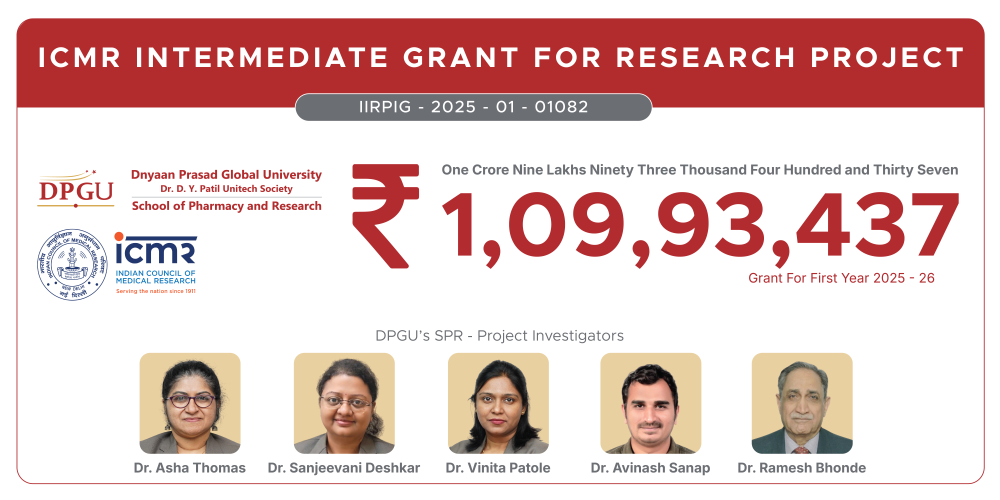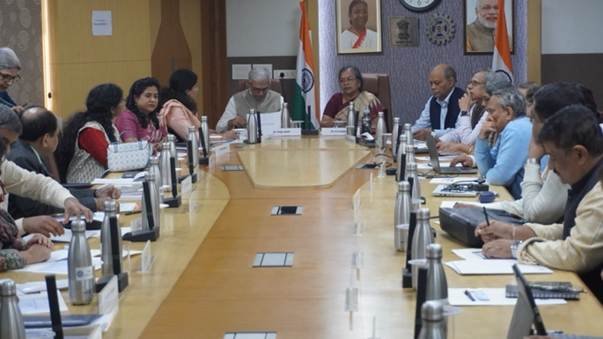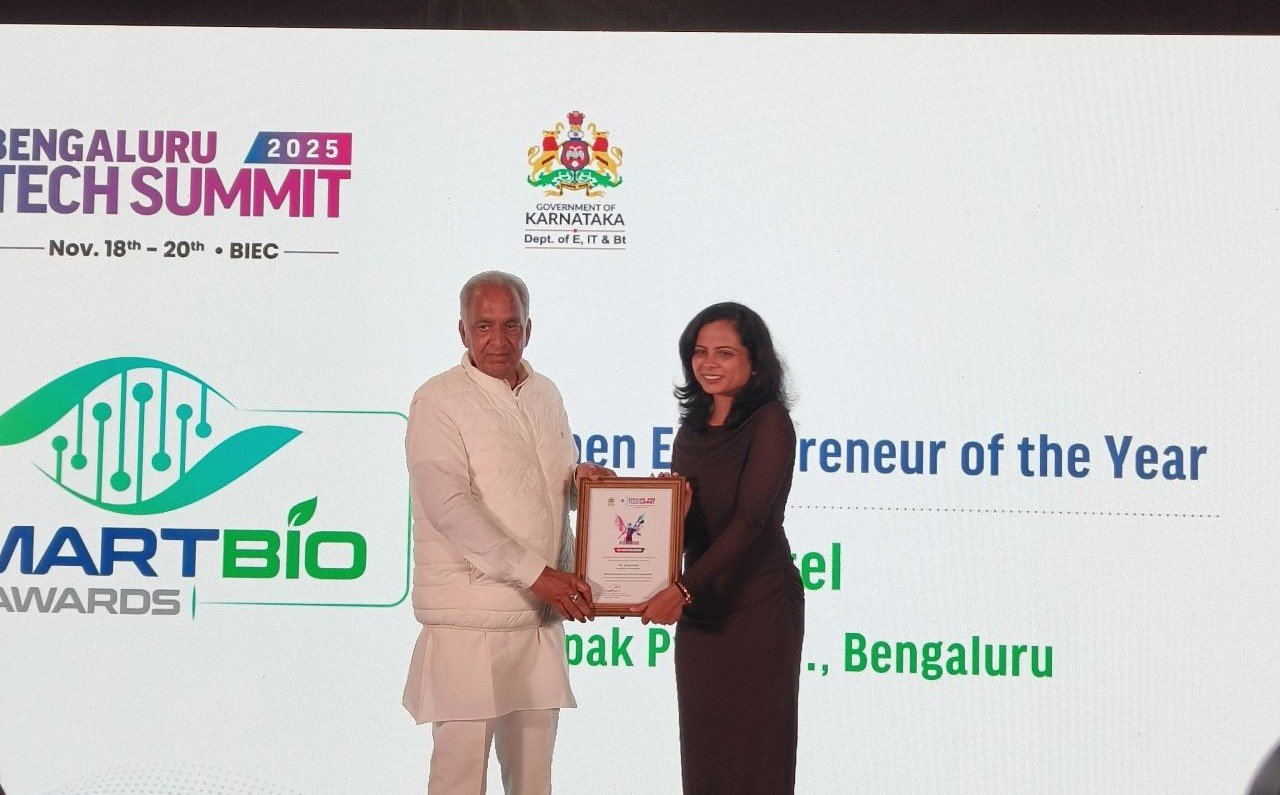Do not pre-compromise on your dreams: Dr Shubha Tole
December 15, 2014 | Monday | Interviews | By BioSpectrum Bureau
Do not pre-compromise on your dreams: Dr Shubha Tole
Prof Shubha Tole, neuroscientist, department of biological sciences, Tata Institute of Fundamental Research & winner of Infosys Prize 2014 in Life Sciences
Whilst as a first-year student pursuing her PhD, a romance began to bloom between her and Dr Sandip Trivedi, who was a fourth-year PhD student in Theoretical Physics in the same Institution. The romance culminated in a wedding.
After spending 11 years in the US, pursuing doctoral and post-doctoral research (University of Chicago), with determination, Dr Shubha Tole and her husband moved back to India in 1999.
They joined the Tata Institute of Fundamental Research (TIFR) in Mumbai as faculty members, and Dr Shubha started her own lab to make a difference among India's scientific community.
Fifteen years later, this past November, Dr Shubha was in for a great surprise. The surprise came in the form of the prestigious Infosys Prize 2014, which crowned her for her pioneering work in understanding how the brain structures that control cognition, memory, and emotions are formed in the embryo.
"I'm extremely honored and humbled. One doesn't work with the thought of awards or prizes. But it gets recognized years later. It is wonderful to know that Indian Institutions are recognizing scientific research. The true value of this award is that it encourages students and stimulates interest in science and research," says Dr Shubha, who was on a sabbatical in Geneva when the award was announced.
"It feels a little unreal since we were not in India when the announcement came, and all the action was happening back in India. My husband was delighted and my children exclaimed shouts of joy," she shares recalling her family's first reaction when they heard about her winning the prize.
Interestingly, Dr Shubha's husband, who works as a professor in the same Institution in the Theoretical Physics Department, was also a recipient of the same Infosys Prize in 2010.
Talking about a scientist's goals, Dr Shubha opines, "A scientist should be a person full of dreams and the grit to follow through no matter what it takes. If he or she has the mindset of seeking fame or applause then probably they shouldn't take up science as a career. That mindset doesn't fit with what is required in science. A scientist's joy comes from the experiment at hand, and the possible discoveries it might lead to."
As for her, the biggest 'Eureka' moment came in her life was when her student, Lakshmi Subramanian, cut open a mouse's brain and saw two Hippocampi instead of one.
"Our brain is a fantastic computer which can do fantastic things," she passionately mentions while speaking about her research work.
"And we all have similar brain circuits. Yet some people when they walk look more elegant than others, while others are able to create great music. Our brain circuits are tweaked in unique ways in each individual. I work on how these circuits are created in an embryo. We used the mouse as a model mammal, but the insights are likely to apply to human brain development as well," she reveals.
One of her major discoveries is attributed to how the center for learning and memory, called the Hippocampus is created in the brain.
"We learnt a great deal about how this structure is created during the developmental stages in an embryo. We found out that there are powerful instructions coming out of a small signaling centre, like a lighthouse in the sea," says Dr Shubha, an alumni of St Xavier's College, Mumbai.
According to her, Neuroscience in India is a young and emerging area. "We are trying to understand how the normal structures of the brain are formed. My research looks at how the brain's blueprint is executed. Our work will be the foundation for possible future therapies," she mentions elegantly.
When she moved back to India in 1999, setting up her lab was a monumental task. However, she says that generally, there are many challenges involved in setting up a laboratory anywhere.
"The nature of the problems are very different in India versus the US. In India we don't have dedicated lab-building companies. You have to pretty much create everything on your own from scratch. For example, I was required to come up with details on how deep the lab's sink had to be as there were no specifications based on regulations. Also, I found myself in a factory in Andheri figuring out things because I needed to erect an exhaust hood in my lab. So it is physically being involved in building the whole infrastructure. But that's part of the challenge and it is also a part of the fun," she jovially comments without an ounce of any regrets.
Another major challenge she sees in running a lab in India is the uncertain power supply. "Precious samples stored at -80 degrees, after hard work by a student for their PhD, can get thawed and years of work can get lost," she emphasizes.
She further explains, "If you are using animal models like mice, people think that they are dirty and hardy, and do not require maintenance. However, these animals need temperature controlled environments, since small animals can overheat easily. We can't face a 15-hour shutdown for repairs even if its once a year. It has to be carefully planned to take care of the animals. Building and maintenance of laboratories is not standardized in India. And there are not enough trained professionals who know how to do it."
Dr Shubha also says that building a lab's manpower intelligently is another challenge.
"Our Indian labs are dependent on students. However, this is not the case abroad. They have expertise from post-doctoral researchers, who are a trained group of senior researchers. They master the know-how's of doing things differently when they do their PhDs and bring their expertise to their post-doc lab. This expertise is easy to get abroad. In India the limitations of the faculty member heading the lab are reflected in the students from that lab, and there are few post-docs to broaden the students' experience. If you are the only one who has the breadth of experience, it is a huge responsibility. This challenge will continue until you are able to attract the right people who are trained elsewhere," she elucidates.
Dr Shubha confidently feels that it is easier to be a woman scientist in India than in the US or anywhere else.
"In India there is a support structure. And TIFR has been an incredible place for this support, with a wonderful childcare center, and on-campus housing," she states. "In terms of job timings, science is the ultimate flexible shop floor where you have the freedom to work when you want. I often manage my lab's projects by looking at Google Sheets or sending email about my students' projects, late at night or early morning whenever I have time."
When asked about juggling between her home and lab, and striking a balance, Dr Shubha immediately says that it is a matter of priority.
"You have 24-hours in a day. You can put in as many work and personal elements as you want. You need to be clear about what you want to do with your life. My personal life is very rich," she exclaims.
In the midst of her happening research, she manages to find time for her kids.
"I work on my kids' school projects and my husband takes care of their homework. I enjoy creative things that enrich my life. We don't do many 'weekend vacations' though or a lot of socializing, beyond an occasional dinner with friends. You pick and choose the elements of your personal life," she points.
Dr Shubha is a mother of two young boys, whom she welcomed when she was 35 and 38 respectively.
"Yes, we had children a little late though we got married early. Each couple has their own trajectories," she smiles.
Her eldest son, Abhay, a class 6 student, is learning Western vocals from Ms Siloo Shapoorjee and Kathak dance together with his mother from Ms Sanjukta Wagh. He is the only boy in the Kathak class.
The youngest one, Nikhil, a class 3 student, learns Hindustani vocals from Mr Sachin More, and enjoys learning tabla together with his father, from Mr Madhurya Konwar.
"I'm not that much into sound. I find it distracting. My husband and children listen to Classical music," tells Dr Shubha, a big fan of sci-fi movies, who loves neuro-based Hollywood flicks like Gattaca, Inception and the Bruce Willis starrer, Surrogates.
"In a movie the creators are not constrained by what is possible and what is real. Their imaginations can sometimes predict the future. Surrogates, especially, makes you think about what shapes your identity as an individual," she says.
In 2008, Prof Shubha was also the recipient of Research Award for Innovation in Neurosciences (RAIN) by the Society for Neuroscience.
In the same year she was also honored with the National Woman Bioscientist award by the Department of Biotechnology (DBT), Government of India.
In 2010, she won the coveted Shanti Swarup Bhatnagar Prize for Biological Sciences, and the same honor was also bestowed on her husband in 2005 for his outstanding work in Physical Sciences.
Commenting on the current education system in India, Dr Shubha opines that teachers do an outstanding job with constraints and limitations they face in the current system.
"Since the beginning, our school system is based on the format that the teacher has all the answers and the students have to ask the questions. Here, the burden is not on the students to find the answers but rather on the teachers," she says.
"Our education system needs to change in what is expected of the students. Our teachers need to be able to transfer the burden of discovery to the students because this encourages creativity. How can one person be the source and the limit of what a student learns in a subject? We need a social change in what is expected from each side. Then you can train teachers on how to go about it. The examinations has to be well structured and spur students' thinking rather than testing their memories," Dr Shubha enlightens.
"For example, the whole idea of drawing diagrams in biology classes! Why do we need to draw perfect artistic diagrams in a biology lab, instead of learning to appreciate the biology that goes into the making of the leaf or insect you are looking at?" she questions. "All the elements of the equation has to change the way of how we have been doing things. This will trigger more thoughtful approach to education and then you get science-minded students. It is impressive that students go on to become good scientists inspite of how limiting the education system is. We need to think of where we can go if we make the change right from school level."
Independent thinking, she suggests, should be expected right from the school days. She advises, "We need to develop the habit of asking students why they think so about a particular matter. This applies to every field. Science is not in any special category. We should bring about that change at a societal level."
"The college where I graduated from, St Xavier's, Mumbai, has always been very forward-thinking and futuristic. Hence our syllabuses often got revamped and new approaches were put together," she credits.
To all the students who find science boring, Dr Shubha has a though provoking message.
"This is not just for science. Many people find history boring because they think it involves nothing but dates and memorization. But some can see beyond this and are fascinated about the historical events and can use the timeline of dates to see a historical movie unfold. The same applies to science. There are people fascinated by science despite how it is taught, and some are on the fence and need a little help to see the beauty. Maybe, if things were taught differently, students might actually would have crossed the boundaries," justifies Dr Shubha.
She feels that one need not have degrees from abroad to carve out a successful career in any field.
"A person's career is primarily dependent on them as an individual - how they set their goals, how committed they are, and how they can balance multiple things together. The path that you take is not the deciding factor. Walking through a rose garden will not give you a fragrant future. The answers are within you, what you make of the opportunities at hand, and how you handle the inevitable low points in your path," she comments.
As a final encouraging remark to all the women, Dr Shubha edifies, "Do not limit yourself and pre-compromise on your dreams just because you think you may not get to realize them. This pre-compromising happens at a very tender age of 10 or 12. Many of my school and college friends have compromised their dreams of getting into professions because they thought it wouldn't work after they get married. So the damage was done back then. That is the biggest limitation. It is not about where you go, or the brand name of the school. It is all about your internal sense of self-worth and whether you believe in standing up for yourself."










